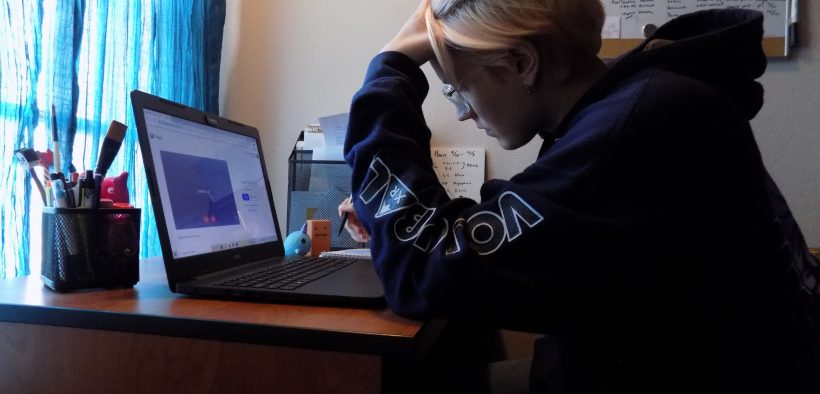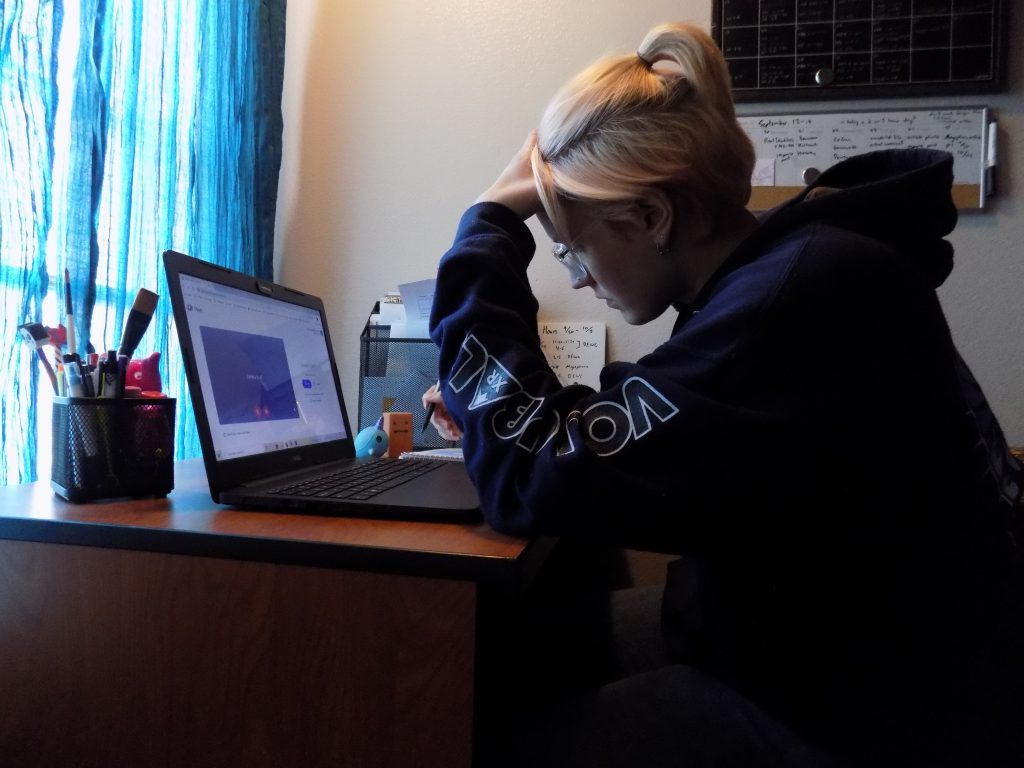Attendance Grades Without Accommodations are Ableism
Share


A student in an oversized hoodie with short pink hair sits at a desk, resting their forehead on their palm as if in pain. A computer sits open in front of them, its screen indicating they are waiting to be admitted to a GoogleMeets meeting. They hold a pen over a blank notebook as if they are going to write. A whiteboard in the background contains a long list of unfinished assignments for the week, and above it is a calendar crammed with classes and meetings to attend.
The blank message box squats in the bottom corner of my computer screen, its light, although dim, drilling pain through my temples. It’s been a year since I’ve had to type up a message like this to a professor, but I’m already reacquainting myself with the uncomfortable dance of attendance grades. “Good morning…” I grudgingly type. “I’m not going to be able to make it to class today.” The words practically type themselves after that, and I press send before I can think too hard about what I’ll be missing in class. My head throbs in protest and I roll back over into the darkness of my bedroom.
Days like this are not uncommon for me, as I live with a myriad of chronic conditions that affect my daily functionality. One day the issue will be a migraine, the other it will be body aches and nausea so bad I can hardly move, and on others my left foot might succumb to its inclination to drag. While I have learned to function despite my illnesses, being a college student on top of them is quite often a monumental ordeal.
The past year, in light of the Covid-19 pandemic, schools, businesses, and communities were forced to stop and face some intense realities about existing in a space where bodies are at risk. Accommodations had to be made: not just for members of the disabled community, but for society as a whole. At Southwestern, we experienced the Spring Break that never ended, the acceptance of a first-year class without an immersive introduction to college, and the inauguration of virtual and hybrid class structures.
This semester, there has been an almost frantic push for pre-pandemic normalcy. We are permitted to go without masks outside, encouraged but not required to social distance, required to attend classes in person. Although these changes have helped to boost the overall morale of students and suggest an end to the pandemic, we are not out of it yet. Additionally, some of these changes ignore the needs of disabled students, whether that be an increased risk of sickness or a return to class structures that force absences out of episodes of chronic conditions. Being penalized for absences when you are physically unable to attend and don’t have the option to attend remotely is essentially penalizing you for being disabled.
Something I have noticed and been affected by is the disappearance of the Google Meets link: a presence that I, as a chronically ill student, am sorely missing. Despite how much the virtual classes sucked, my attendance was more consistent than it has been for most of my life. Don’t get me wrong, I much prefer attending class in person to avoid those painful silences and blank boxes. There’s something that just hits different about awkward silence in a physical space with other people – or on the flip side, excited engagement from multiple parties in the classroom. In person interactions with students are essential to my learning style and much more comfortable in my heavily discussion-oriented classes. Yet, despite this preference, there are many days where my body says otherwise.
The purpose of this article is to argue for the integration of hybrid options as an accommodation for students. Obviously, I don’t understand the logistics and difficulties of this process, but I strongly believe that all students’ accessibility needs should be met. I doubt many, if anyone, would prefer to attend online if they had the choice: but being given that choice is something that will help disabled and chronically ill students miss less class when their bodies are preventing them from physically attending. If a hybrid option isn’t feasible, a normalization of recorded lectures would also be an accommodation that could meet this need. There just needs to be something so students like me no longer have to perform the electronic dance of absence.
I don’t, however, want to ignore the accommodations that are already available to students. Jennifer Smull and the Center for Academic Success provide great resources for students with disabilities and chronic illnesses in both their academic and residential life. I have applied for several of the options offered by this department, gone through interviews and provided necessary paperwork, and have been assisted in the best ways possible for my specific needs. While some might say accommodations are “handed out like candy,” the prevalence of student support systems is rather reflective of a moment of incredible visibility and action around degrees of ability. I cannot stress enough how invaluable accommodations have been to me.
Although there are many options available already for students who need accommodations, the option to attend class online is an addition to class structures that allows students to still attend class while sick or suffering from a chronic illness. My first year, pre-pandemic, I was faced with the option of either going to class and being in pain the whole time or not going at the expense of learning material and attendance grades. Virtual schooling options and compassionate professors made for a much smoother educational experience with regards to my disability, and taking away that option is something of which I’m already facing the repercussions.
I understand SU strongly emphasizes that they do not accept remote classes, and I respect that commitment with regards to the general student population. In light of the pandemic, however, these policies needed to change, and they did change. Now that pandemic matters are beginning to get more manageable, there is a push to return to normalcy and to the completely in-person experience. This push ignores the needs of chronically ill and disabled students who did not have the ability to attend online classes pre-pandemic, were suddenly accommodated, and now have had that flexibility of attendance revoked. It is presumptive to go back to “normal” after – and I use the term ‘after’ only to indicate progress in pandemic management, not resolution – a pandemic, especially to a “normal” that ignores the nuances of the Southwestern community. To take away an accommodation that has been proven to work at preventing continuously added up absences is a move with which I strongly disagree.
Accommodations are possible and redefining normalcy to include more of the student population is a necessity: but these things require communication and compassion on all fronts.
